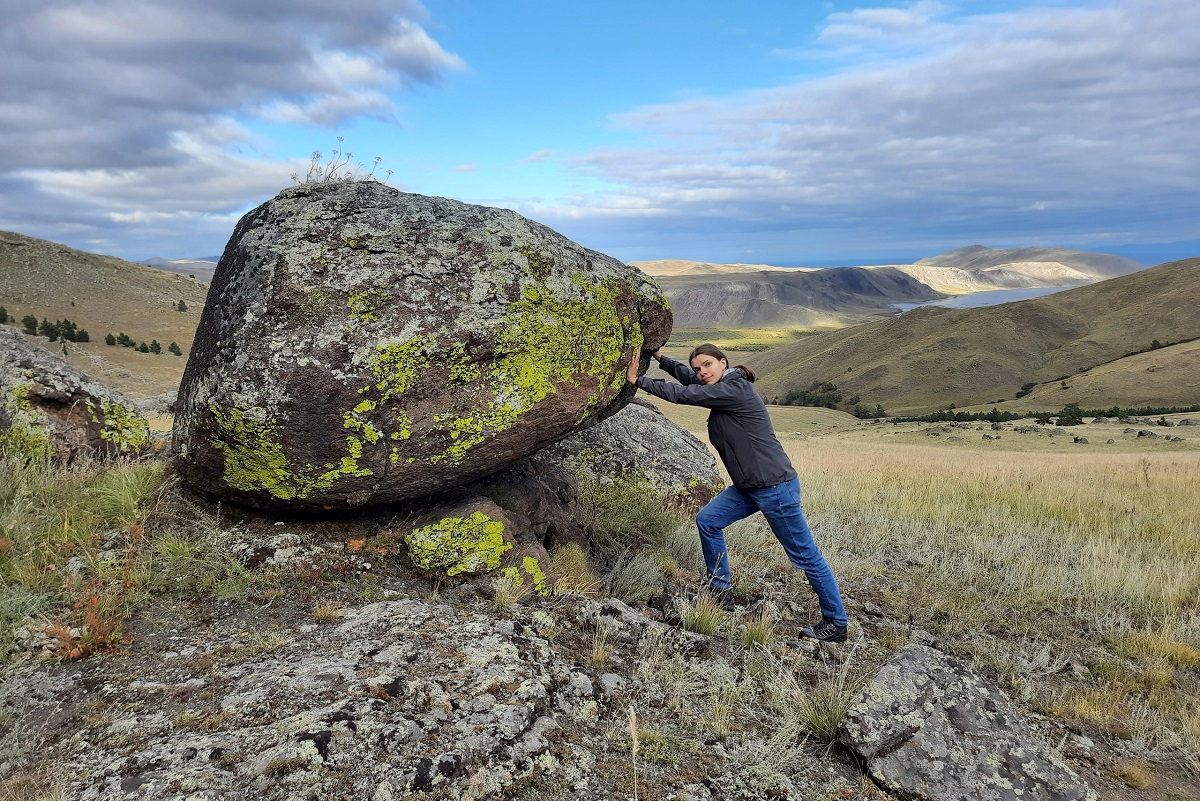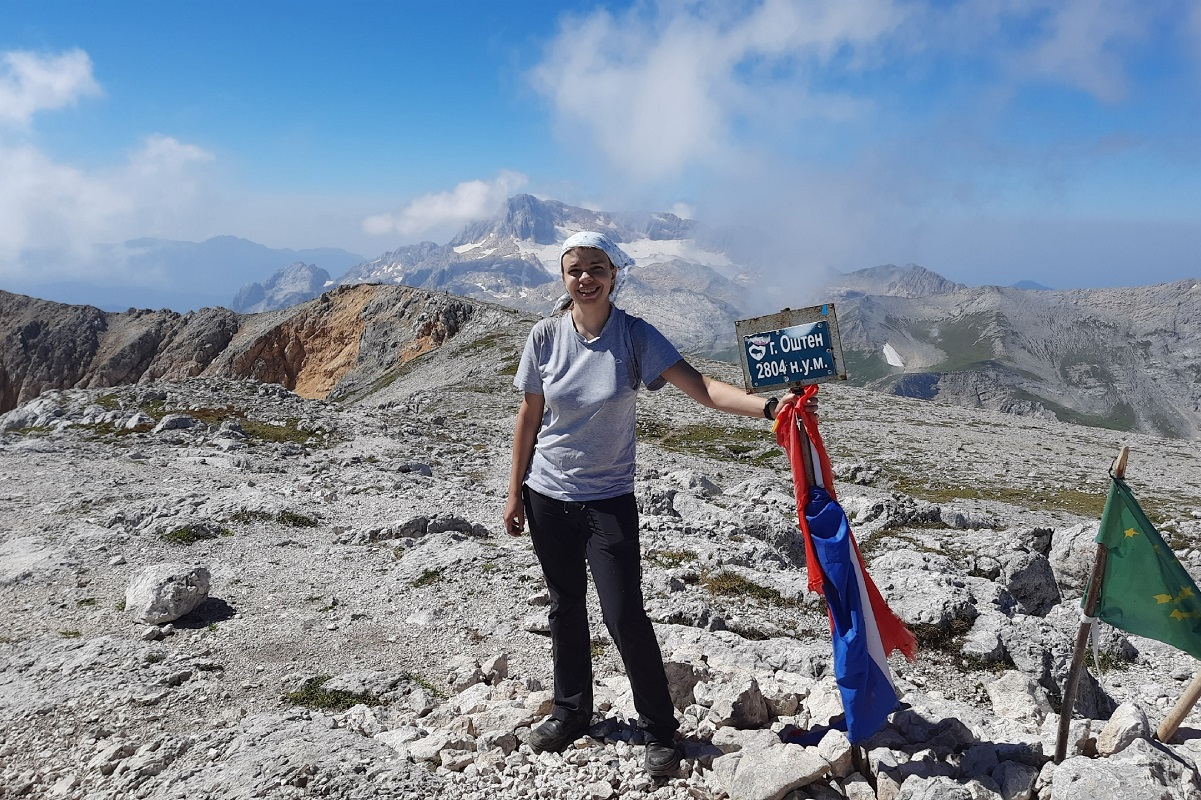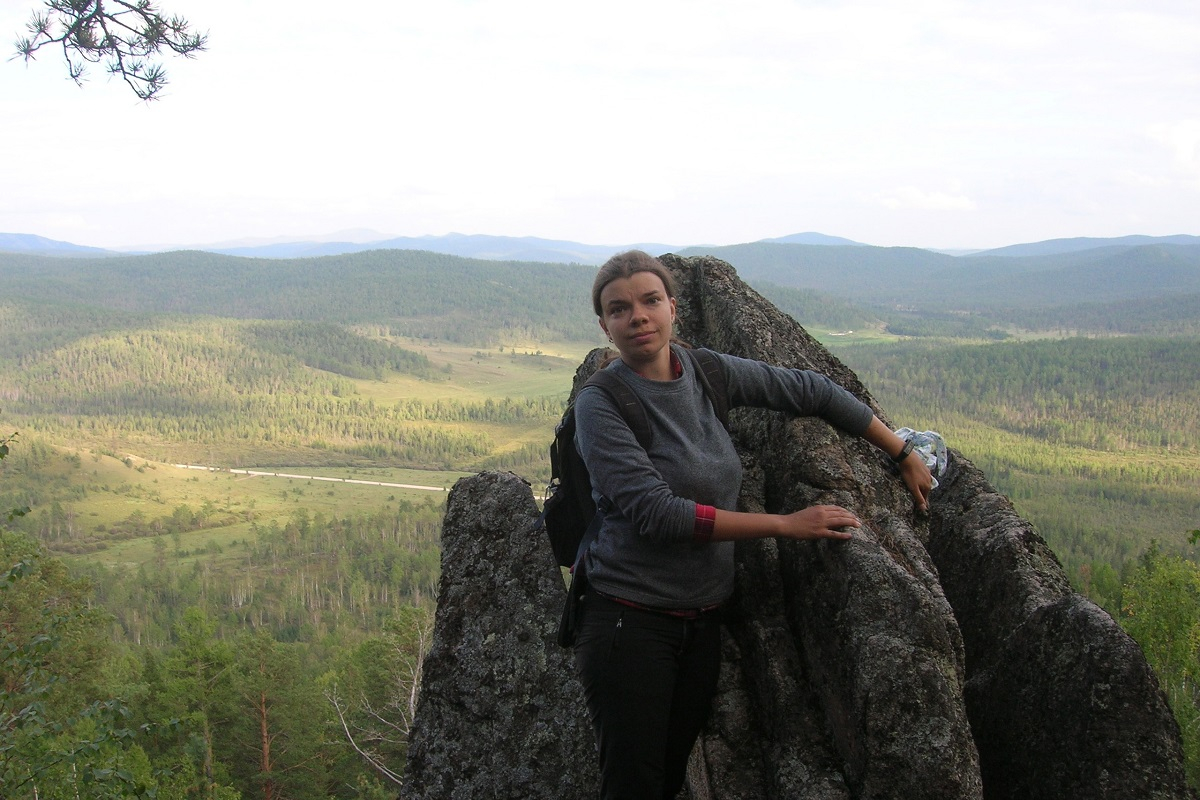Ekaterina Akimova: "Even after defending my candidate dissertation, I remain incorrigible to a certain sense — I am still interested in absolutely everything"
Ekaterina Akimova, Assistant Professor in the Department of Petrography at St Petersburg University, who has defended her dissertation to gain a degree of Candidate of Geology and Mineralogy at St Petersburg University, talks about what attracted her to become a geologist, why it is good to do research during expeditions, and shares her impressions of going through the defence procedure according to St Petersburg University’s own rules.
How did you come to the decision to have a career in science? What influenced your choice of the scientific direction?
It happened that I became interested in geology as a child, when I was in elementary school. On the school territory, where I often walked after classes, there was a lot of rubble, and its variegated colours attracted my childish attention. I read in some book that the rock, pieces of which I came across near the school, is called granite. It consists of several minerals: pink, i.e. potassium feldspar; white, i.e. plagioclase; light grey, i.e. quartz; and black, i.e. biotite. At home, I subsequently made small collections, where one or another mineral predominated. I was immensely surprised by how all these minerals were "stuck" together. And I tried to invent different theories. Then, I had books about minerals. Although the books had many incomprehensible words, they abounded with amazingly beautiful photographs of minerals, which I could scrutinise for days.
Perhaps, this is how I decided to choose my profession. When someone asked me what profession I wanted to choose, I invariably answered that I wanted to become a geologist. Yet, no one took my words seriously. But I was serious. When I graduated from school, I decided to enter the Faculty of Geology at St Petersburg University. I did not regret my choice. I liked my studies. There were no subjects that I did not like. However, the decision to engage in science and the choice of a specific scientific direction did not come to me right away. Probably, I realised it during my master’s studies. Before, I had been searching for so long. I had changed departments and research supervisors. I did not have the slightest idea what I wanted to focus on. In the first year, I wrote a term project at the Department of Palaeontology. Then, I decided to study at the Department of Mineralogy. During my master’s studies, I transferred to the Department of Petrography. Only then, I finally decided on the topic of research.
What is your dissertation about? What influenced your choice of the topic?
The topic of my future dissertation fell on me unexpectedly, like snow on the head, when I started my master’s studies. I remember how I came to Viktor Glebovitsky, Head of the Department of Petrography, and asked for help in choosing the topic of my master’s graduation project and a research supervisor. He told me what I could do at the department, but I could not choose something specific and said that I was interested in absolutely everything. He was unhappy with my vagueness and said that I should not say that. In despair, I asked him to write "at least something" into my curriculum in pencil. A few days later, I met Kirill Lokhov, who was Head of the Department of Isotope Geology. He seemed to have a light hand. He offered successful topics to many students. I was also lucky. He recommended to study corundum-bearing rocks of the Belomor mobile belt, and this topic immediately seemed gripping. Viktor Glebovitsky was not against it and shared my interest in this topic, which I immediately delve into.
Thanks to Kirill Lokhov, I learned many intricacies of scientific work: searching for scientific information, writing abstracts and articles, presenting reports at conferences, applying for grants. Unfortunately, my scientific work under the supervision of Viktor Glebovitsky and Kirill Lokhov was not long. Viktor Glebovitsky passed away a year after I started my master’s studies. Kirill Lokhov was later seriously ill, and he also passed away. Despite the change of research supervisor during my master’s studies, I did not change my topic of research, and I continued my dissertation.
You are currently an assistant professor in the Department of Petrography at the Institute of Earth Sciences. Did your work at the Department help you in writing your dissertation?
I started teaching and joined the Department of Petrography after completing my doctoral studies, when my work on the dissertation was in full swing. My situation was getting difficult. The work on the research was dragging on, no one was helping me, the subject matter was starting to bore me. Starting to work at the University became a salvation. I found a new research supervisor, who was Sergei Skublov, Doctor of Geology and Mineralogy, and I completed my work on the dissertation. I was finally lucky enough to find myself in a comfortable and friendly environment, to gain creative freedom. Perhaps, this is the greatest value of working at the University for me. Even just the opportunity to sit quietly at the microscope without anyone distracting me is wonderful.
Your bachelor’s, master’s, and doctoral studies are connected with the Institute of Earth Sciences at St Petersburg University. Was it a conscious decision or did you have a choice between several educational institutions?
As I have already said, the decision to enter the Faculty of Geology at St Petersburg University after school was my conscious decision. Nevertheless, when I entered the University (it was in 2010), there was an opportunity to apply to five universities, choosing up to three areas in each of them, and as a safety net, I took full advantage of this opportunity. I cannot ignore one funny circumstance. My relatives and teachers did not support my "geological fanaticism" at all and believed that I should enter the Faculty of Philology. I applied to the Faculty of Philology, too. On the eve of the entrance exam, I found out that I was passing the competition for the Faculty of Geology, and I jumped up to the ceiling with joy. The next day, having told everyone with the most honest eyes that I was going to take the entrance exam to the Faculty of Philology, I went to submit the original documents to the Faculty of Geology.
Well, after receiving my bachelor’s degree, I applied exclusively to geology, because I liked studying and I did not see myself in any other profession. After completing my master’s degree, I was completely immersed in scientific work and was constantly conducting research, and the process of applying to doctoral studies seemed something self-evident.
How do annual practices and expeditions help you conduct your research?
Expeditions and field practices are an integral part of the life of any geologist, and scientific research is impossible without field work. I have repeatedly participated in field work in the White Sea area when I was working on my master’s graduation project and then candidate’s dissertation. When I was a master’s student, I began to assist in conducting the University’s summer field practices in the Sablino and Svirskaya Teaching and Research Centres. Having already become a lecturer, I began to participate in conducting the practice on geological mapping, which traditionally takes place in the Crimea. Last year, due to the difficult political situation, it took place in Adygea, and this year in Khakassia. Although it is not easy to adapt to conducting the practice in a new place every year, I managed to collect material for research, which is now waiting in the wings, i.e. for a student willing to write a term project at our Department.

When you are in a field, it is good not only to take routes to collect material for research. Fresh air makes any work more effective. During my internship in the Crimea, I was simultaneously writing a dissertation, and in Adygea and Khakassia I was working on articles. Now, I am thinking how I managed to do all this. After all, I had to go on routes, work with students. There was even less free time than usual. How was your defence? Is it difficult to defend a dissertation at St Petersburg University according to the University’s own rules?
How do you think this procedure is organised?
To be honest, I was initially scared off by the need to find a foreign member of the dissertation council and translate the dissertation into English. I had almost given up hope of defending my dissertation at the University. After consulting with my research supervisor, I decided that all these circumstances were not insurmountable. I managed to translate the dissertation into English on my own and it took about a couple of weeks. I did not have to look for a foreign member of the dissertation council for long either. My colleagues started to recommend candidates. When I found a foreign specialist, my research supervisor helped me agree with him about his participation in the procedure of my defence.
Perhaps, the most important moment was submitting the dissertation for consideration to the dissertation council. It was necessary to collect all the documents and carefully check the dissertation manuscript for typos and errors in the formatting. For me, this was difficult, as I am far from being good at paying attention to details. One annoying typo was found after it was printed. I had to run to the printing house again and change the page in the manuscript. I was in a hurry to finish all this before the end of the year, sometimes sitting until late at night. When my work and the package of documents were accepted, it became much easier. Those five months that passed from the moment the dissertation council accepted the dissertation until the day of defence, I devoted to scientific work, almost did not think about the dissertation. A couple of weeks before the defence, I leisurely prepared a presentation and a report, collected reports from the members of the dissertation council and other colleagues, thought about my answers to the question in the reports.
The defence itself was quite calm, in a pleasant working atmosphere of the Assembly Hall at the Faculty of Philology, where I once changed my mind about entering the Faculty of Philology. After some time, I can say that the defence procedure at the University did not bring me any serious difficulties. It was quite transparent, understandable, logical, without any exhausting paperwork. The only thing I would like to improve in this procedure in future is to reduce the time period from the moment the dissertation council accepts the dissertation until the defence date.
What are your plans now, after the defence? Are you planning to continue scientific activity and defend your doctoral dissertation?
Continuing my scientific work somehow naturally took shape even before I managed to finish writing my dissertation. The mere need to prepare it for defence began to weigh me down. Now, I am glad that I was able to throw this burden off my shoulders and can calmly continue doing scientific work. Now, after the defence, I have the opportunity to apply for grants. I think I will actively use this opportunity.
I do not know yet whether I will defend my doctoral dissertation. I feel that at the moment it would be difficult for me to decide on a topic. Right now, I am working on several subjects at once and remain incorrigible in a sense — I am still interested in absolutely everything.



